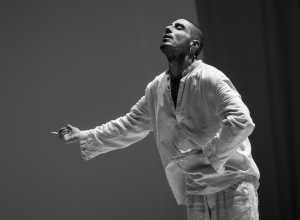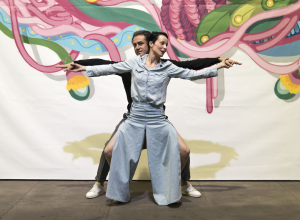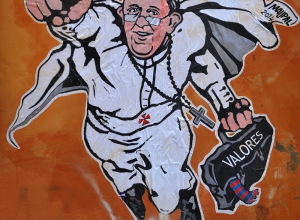#DEFINE STREET ART
Approciare l’arte di strada significa per me in primo luogo approciare il tema della fruibilità dell’arte e dell’incontro tra l’artista e il pubblico occasionale. L’arte di strada rappresenta secondo me, innanzitutto, un’ammirevole strategia per accorciare la distanza, spesso abissale, tra l’autore dell’opera e il suo fruitore in un contesto, quello della strada appunto, in cui il metodo dell’improvvisazione e la libera espressione agevola l’incontro e il dialogo tra l’artista e un pubblico sempe diverso, eterogeneo, il più delle volte disparato. Guardare l’arte di strada è come restituire all’arte stessa quella vocazione sociale che esula dalla fruizione strettamente privata, quasi egoistica, e la fa diventare arte per tutti e non solo un fatto attinente alla sfera personale. Mossa da queste convinvinzioni e determinata a trovare un artista con cui confrontarmi, ho avuto la fortuna di incontrare Francesco De Luca, il fondatore del gruppo Compà Dreush, noto al pubblico con il nome d’arte Bboy Telemare. Sarebbe riduttivo definirlo un danzatore, mi piace pensare a lui come ad un attore e al tempo stesso autore dell’opera d’arte (non per niente a Milano si è formato alla scuola teatrale “Quelli di Grock”) che si muove libero nel palcoscenico della strada, in un intreccio costante di danza e gestualità. Un ragazzo che viene dalla Calabria, una terra in cui non è concepito ballare e tanto meno esibirsi per la strada, “da un posto in cui già da piccolo ti spiegano cosa devi dire, come lo devi dire e soprattutto come ti devi comportare” mi dice Francesco. Una terra in cui sei perennemente controllato e ballare per strada diventa quasi impossibile. Eppure lui dieci anni fa, insieme ad un amico marocchino, fonda la crew Compà Dreush quasi a voler dimostrare che con la volontà si possono in qualche modo rompere gli schemi e ci si può consegnare ad un destino diverso da quello al quale i limiti ambientali apparentemente ci obbligano. “Volevo portare in giro per l’Italia l’altra faccia della medaglia, perché io quella vita lì non la volevo fare”. L’insolito nome Compà Dreush tanto insolito poi non risulta se si pensa alla strada anche come luogo di incontro tra culture, luogo di aggregazione e di reciproco scambio. Ecco allora che il calabrese “compà”, la forma dialettale con la quale gli amici si salutano tra loro, incontra il marocchino “dreush” la forma dialettale con la quale si indicano gli umili, i ragazzi poveri ma buoni. Sono gli amici umili, Francesco e Rahal, che dalla Calabria risalgono ballando la costa tirrenica fino alla Basilicata. Nelle diverse scuole Francesco insegna ai ragazzi a ballare e trasforma gli allievi a loro volta in insegnanti. Così il nome del gruppo si diffonde e i componenti aumentano tanto che adesso se ne contano circa 150. Francesco ha avuto il merito di aver guardato alla cultura dell’hip hop e dei Bboys sapendola personalizzare fino a farla diventare arte di strada, arte che interagisce con un pubblico sempre diverso, arte fatta anche di mimica, di gesti teatrali, della contaminazione di generi musicali diversi.“Noi usiamo la tarantella come la musica dei cartoni animati nei nostri spettacoli” mi spiega Francesco “ dipende sempre dal pubblico che abbiamo difronte e dalla città nella quale ci esibiamo. Possiamo anche ballare la break dance utilizzando la musica da pianoforte”. Esibirsi senza chiedere denaro in cambio, solo con l’intento di diffondere la propria arte e diffondere anche un messaggio positivo di socializzazione, di allegria, un modo sereno di guardare alla vita. “La strada mi ha dato le migliori opportunità. Arrivo in strada, metto in scena un film diverso ogni volta in cui io, proprio io, sono l’attore protagonista”, mi dice Francesco e mi spiega, pieno di orgoglio, come sia bello essere un punto di riferimento, un esempio da seguire, per tanti immigrati che incontra in giro per l’Italia. Un mestiere, quello di strada, pieno di difficoltà. Mancano sovvenzioni, agevolazioni, la pubblicità viaggia solo nei canali non istituzionali dei social networks, mancano gli spazi in cui esibirsi e le difficoltà burocratiche nel richiedere le autorizzazioni sembrano a volte insormontabili. Eppure contro tutto e tutti Francesco è qui, a raccontarmi la sua storia, che è una storia di passione, di volontà, di riscatto. E sorride ugualmente anche se piove a dirotto e non può esibirsi. Sorride perché la sua è una storia d’amore in fondo. La sua è la storia di un artista.
Desidero ringraziare per la cortese intervista Francesco De Luca (Bboy Telemare) www.compadreush.eu
Video di Pasquale Russo
Traduzione di Chris Alborghetti
THE DUMMY MEETS COMPA’ DREUSH #DEFINE STREET ART
To approach street art and busking means to me firstly to enjoy art outside places such as museums, venues, etc. In these places art is considered what it is according to certain parameters and canons decreed and sanctioned by institutions, the market, influential individuals, etc. Secondly, street art and busking facilitate greatly chance meeting between the artist and the passer-by, who at times, becomes a fascinated onlooker, therefore street art and busking put immediately in touch the performer and the fortuitous audience. This means that contrary to what happens in museums and venues, street art and busking, in my opinion, knock down or transcend the barrier there is between the artist and the audience. Furthermore, since performances and any other form of art take place in the street, canons and parameters agreed by institutions as well as popularity due to massive advertising in the mass media are not valid anymore. In the street is the passer-by who decides if the artist or the work of art is worth his or her attention. Venues, galleries and museums promote artists, “if they or their works are there they must be good”, that is what people think. In the street it is different, we decide what is good and what is not, exclusively according to our perception of the artist or the work of art. Street art and busking often have to do with a very heterogeneous, diverse and colourful audience and this, inevitably, entails improvisation. So in the street artists improvise more than what their counterpart would do in a classic show or performance in a theatre or a venue for instance. Improvisation in turn, frees the artist from schemes and rules and as a result turns what it would be otherwise an ordinary and conventional performance into something extraordinary and unconventional. This somehow facilitates the interrelation and exchange between the artist and the spectator. That is why in my view museums and concerts are definitely more mological. I mean, they refer to a monologue where the artist and the work of art send a precise and univocal message to the audience. Rather, street art and busking have dialogical properties, they are free from canons, rules and schemes. In this way they not only favour the dialogue between the performer and the spectator, they also make art available to everyone and not only to those who have the cultural code to understand it or the cash to afford it, they elevate art and make it social. This is the reason why I wanted to have an exchange of views with a street performer, with a real busker. I was in luck, I met Francesco De Luca, the founder of the crew Compà Dreush and known by his stage name Bboy Telemare. I believe it would be inappropriate to define him as a dancer, since I strongly believe he is an actor too. He is the person who creates and plans the movements, twirls, steps and dances to be performed on the street. He was trained in these artistic skills in the theatrical school Quelli di Grock (Those of Grock) of Milan. Francesco comes from Calabria, a region in the south of Italy where dancing or busking in the street is neither a priority nor something imperative in life. These are places where as Francesco states “when you are a child you are already told what you have to say, how you have to say it and especially how you have to behave.” In other words, in a place where adults constantly keep a close watch on children and other adults alike, busking becomes nearly impossible. Nevertheless, about ten years ago Francesco and a Moroccan friend found the crew Compà Dreush. Their determination to succeed and as a consequence to be mavericks, free thinkers and nonconformists would somehow shape their destinies and inevitably this, would make them different from many people, often regarded as backward and narrow-minded, living in these areas. “I wanted to show people all over Italy that even though I come from a place like Calabria and believe me, because of this at first blush people tend to make assumption about me, I’m neither backward nor narrow-minded. Actually, the other side of the coin is that when people get to know me, they change their mind and take their hat off to me. I didn’t want to live as many people do down there, if you know what I mean.” Compà Dreush is an unusual name, it would not be that unusual if we thought of it as something connected with the street, I mean the street seen as a place where different cultures meet, intermingle and interact. As a matter of fact, it is in the street where Francesco “compà” (in Calabrian regional dialect this word would be a sort of “hi mate” in England), met Rahal “dreush” (in Moroccan dialect this word is utilised when addressing humble and poor but good boys). These two humble friends started dancing in Calabria and went north performing along the Tyrrhenian sea coast up to Basilicata, another region in the South of Italy. They taught dance in schools and trained their students to become teachers too. This made the crew more and more popular to such an extent that to this day there are about one hundred fifty people who have become members of the band even though they perform in different places. I credit Francesco with having been able first to intermingle with hip-hop culture and live it fully, also thanks to bands like the B-Boy, and afterwards to customize it so as to transform it into street art and busking. In the street then, Compà Dreush recall hip-hop subculture and therefore the interaction between the artist and the onlooker, the gesticulation and obviously the musical hybridisation between hip-hop and another music genre like rap. As Francesco puts “In our show we use Tarantella music as well as cartoon music. It depends on the audience and on the city in which we perform. At times we even break-dance to the sound of grand piano music.” Whenever they perform, they never ask for money at all. All they want is to express and spread a message full of joy, serenity, caring and sharing. Through dancing and art they want to show other people the beauty of being together while looking at life positively. Francesco adds “The street has given me the best opportunities. In the street every single time I perform, I show the audience a new film and consequently, me playing a new main character.” Full of pride, he tells me how great he feels when anyone of the many immigrants he meets around Italy takes him as an example to follow, as a model of wisdom and as a reference point too. Busking and street art are going through hard times though. There are neither subsidies nor grants and on top of that publicity and advertising take place only in social networks. There are no so many places where artists can perform and to be licensed to do it they have to face up to Italy’s bureaucracy which means insurmountable difficulties. And yet, Francesco is here telling me about his story which indeed is full of passion, determination and willpower, qualities that altogether redeemed his past that often was difficult, tough and hostile. And although, while we are talking, it is pouring down with rain, which means no way he can possibly perform, Francesco still manages to smile. He grins at me because as aforementioned he looks at life positively and to a certain extent he feels he has been privileged to be an artist. His story is a love story between him and art and as a result between him and life, between him and the world.
I would like to offer my special thanks to Francesco De Luca (Bboy Telemare) who gave the interview to me. www.compadreush.eu
Video by Pasquale Russo
Translation by Chris Alborghetti





